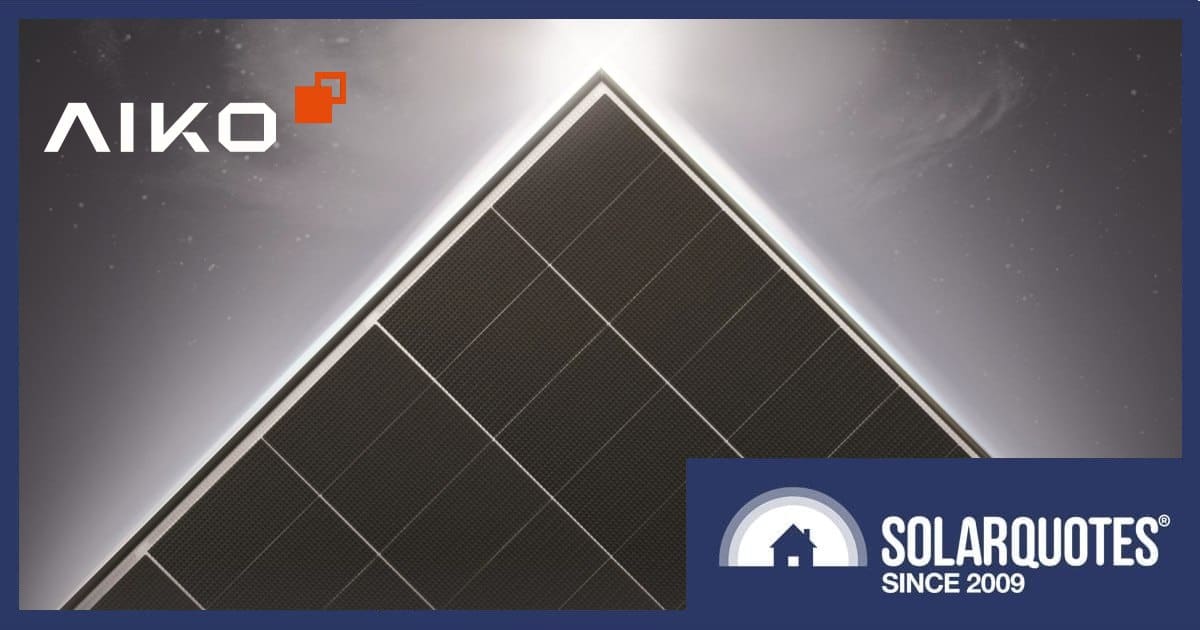
While targeting commercial and other applications, Aiko’s comparatively featherweight Nebular solar panels may find some residential uses in Australia too.
Solar panels are fairly hefty beasts – a conventional 440W PV module usually weighs around 21 kilograms, with some topping 23 kg. Most residential rooftops can handle the weight of a system no problem – but some may not. And then there are other domestic structures such as sheds and carports that may not either.
Solar panel weight can present a challenge for some commercial buildings too that have what’s called “slender” roofs. These are built to minimum specifications without the load bearing capacity to cope with the collective weight of a bunch of PV modules and racking. This can mean upgrades so complex and/or costly that they simply don’t happen.
Pilot shipments of Aiko’s 440W Nebular solar panel, which weighs just 8.6 kilograms, have arrived on our shores. While not the first to offer lightweight panels here – another example is Sunman Energy – Aiko says Nebular is the first combining a reinforced standard frame with a glass-free design; allowing the use of conventional mounting systems.
440W Nebular (AIKO-A-MAH54Tm) Solar Panel Specifications
- Weight: 8.6kg (±3%)
- Dimensions: 1762 x 1134 x 30mm
- 22% module efficiency
- Power Tolerance: 0~+3%
- N-Type ABC (All Back Contact) cells
- Black anodised aluminium frame
- Temperature Coefficient of Pmax: 0.26%/ °C
- Transparent front sheet, but the material used isn’t mentioned.
- Operating Temperature -40℃ – +85℃
- Hail test: 25 mm diameter hail at 23 m/s (standard hail resistance)
The warranty is rather ordinary, with just 12 years product and performance (minimum 91.5% of nameplate capacity at year 12) warranty provided. Aiko’s “conventional” Neostar solar panel range that is most commonly installed on residential rooftops here offer a 25-year product and 30-year performance warranty.
I haven’t spotted pricing for the Nebular as yet and couldn’t find these panels on the Clean Energy Council’s approved modules list this morning. They may be under another model number or awaiting listing. But if they aren’t and don’t get listed, that means they aren’t eligible for the national solar rebate, some state incentives, and grid connection permission could be an issue.
I should emphasise that Aiko isn’t promoting Nebular solar panels as a residential solution that I’ve seen so far. I’m just suggesting the possibility of their use in residential scenarios if all regulatory boxes are ticked.
A full datasheet for the Aiko Nebular can be found here.
Aiko Continues Turning Heads In Australia
While Aiko is a Japanese name, the company is Chinese. The firm was founded in 2009 as a solar cell manufacturer and started producing panels in 2022.
Officially launching here just over a year ago, Aiko is still a relative newcomer to Australia and has an office in Melbourne. The firm has attracted significant (mostly) positive attention since its arrival, again recently with its high-efficiency Neostar 480W solar panel for residential rooftops that has a compact footprint of 1757 x 1134 mm.
Aiko solar panel reviews here on SolarQuotes have been generally favourable, with the brand scoring an average of 4.9 stars from 76 ratings so far. Aiko also took out first place in this year’s SolarQuotes Installers’ Choice Awards for the best solar panels in 2025; quite a feat given the company’s short time in Australia. The firm is currently a SolarQuotes recommended panel brand, generally sitting towards the budget end of modules we recommend.
Accolades beyond our shores include a Red Dot Design Award in 2023 for Aiko’s “exquisite design that fascinated the jury”.

 RSS - Posts
RSS - Posts



Hi Michael, thanks for noticing our technology. We certainly appreciated the due diligence from the Solar Quotes team when we were in Adelaide at the SEIA conference.
Having the IEC/TUV certificates in hand, the CEC listing is expected very soon. Our CEC application was lodged in December approximately and we recently had dialogue with CEC, so we understand approval is imminent. As an industry, since these products and many others already have TUV / IEC listings that CEC listing works from, it would be our hope we could see the listing time shrink from near to 6 months back to a workable time.
This product is designed for applications where you might want to pre-assemble a block together, and still have the block not heavy, or where the roof top, the transport (or users ?) are not able to take the weight. Dongas, coolrooms etc.
Some regional + 3rd world electrification work still relies on air transport and donkeys so we see a role for it there too.
Aiko solar panels seem like a viable option.
But, as a welder using 15 amp supply and making regular use of two welders, a plasma cutter and compressor, I need good battery storage to support daily power usage.
What are the best power/battery storage options for myself as a small business alone, not as a householder?
Hi Leo,
Bigger is always better but we’d need a lot more detail to recommend something. Are you 3 phase or single?
Best advice I can offer is that welders and compressors have huge inrush currents at start and huge peak demand, so you want something gutsy.
If you want to do these tasks during an outage then there’s only one solution I would recommend.